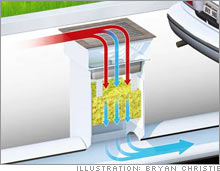'Green' sponge cleans up dirty waterwaysAbTech Industries has developed a simple device that helps cities clean up polluted spilloff.(FSB Magazine) -- The U.S. environmental Protection Agency has ordered that all towns with populations of more than 10,000 must stop grease- and oil-contaminated storm water from running into lakes, rivers, and other waterways by 2008. To combat such pollution, cities such as Chicago are already spending as much as $3 billion to build huge underground reservoirs and tunnels where rainwater can be treated. But in early 2007 a Scottsdale startup will begin selling a more cost-effective solution, one that easily fits into a city's existing sewer system.
AbTech Industries has spent seven years and $16 million developing its Smart Sponge filtration technology. The sponge, made from the same plastics found in automotive dashboards and sneakers, can be molded to fit any catch basin, drain or pipe. It absorbs oils, PCBs and other toxins while allowing water to pass through. The contaminants permanently bond to the sponges, which can be thrown away without harming the environment (or even recycled). Depending on the location, the sponges must be replaced every one to three years. More than a dozen cities and Newark Liberty International Airport already line their drains with the Smart Sponge, catching pollutants leaked from cars and planes. AbTech's latest version, due to hit markets in mid-January, comes dipped in an antimicrobial coating that destroys bacteria as well. AbTech (abtechindustries.com) has been testing the new sponge since 2004, lining 1,950 storm drains near the shore of Southern California, where high levels of E. coli and enterococcus bacteria sicken nearly 1.5 million swimmers each year and force cities to close beaches. On average, the Smart Sponge has killed about 75 percent of those types of bacteria and costs about one-tenth the price of systems currently used to clean up polluted water. (Most cities either route contaminated seawater through a filtration plant or set up large lamps along the beach, which destroy bacteria by shining ultraviolet rays into the water.) "A city would have to pay at least $700,000 to deploy and maintain these light systems," says AbTech founder and CEO Glenn Rink, who launched the company in 2000. A former executive at an agricultural products company, Rink says he drew his early inspiration from a 1996 oil spill off the coast of Puerto Rico. "I watched government crews swabbing fish and rocks with what looked like paper towels," says Rink, now 46. "I figured there had to be a better way." Please send feedback or column ideas to fsb_mail@timeinc.com. ------------------------------- 10 big ideas coming from small businesses in 2007 |
|

